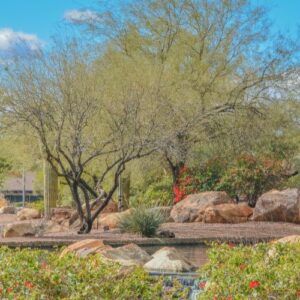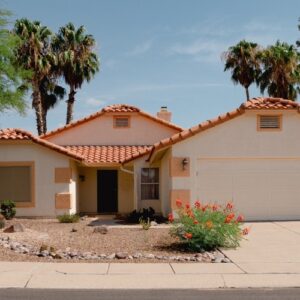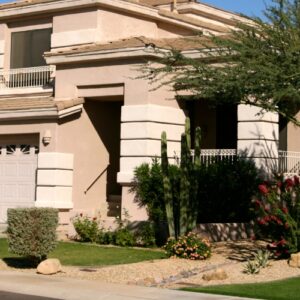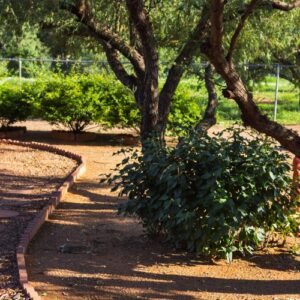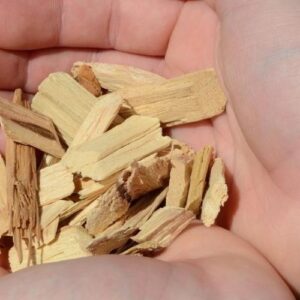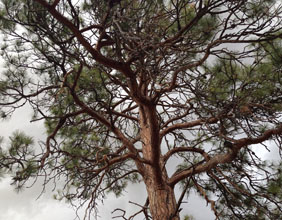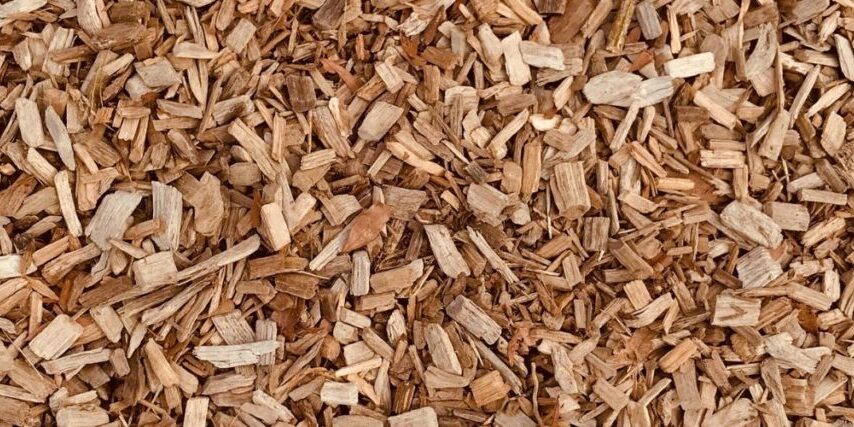
A quick drive around the Phoenix or Anthem areas will show you that a majority of homes, residences, and buildings have some sort of rock or gravel instead of grass-based lawns. While using rock may be better for our area than grass, it’s not necessarily the most ideal option.
In this article, we’ll compare and contrast using rocks versus wood mulch as the basis for a Phoenix-area yard. Both have benefits and potential downfalls, and we will cover them here.
What do we mean when we refer to “mulch”?
In this article, mulch refers to organic wood chips that may include bark. In other instances, mulch can refer to a variety of materials, both organic and inorganic, including:
Organic Mulches
- Grass clippings
- Compost
- Straw
- Peat moss
- Leaves
- Hay
- Pine needles
- Seaweed
- Alfalfa
Inorganic Mulches
- Rubber
- Glass
- Plastic
- Landscape fabrics
Rocks are also sometimes referred to as “rock mulch,” but in this article, mulch will always refer to a wood-based material.
Rocks used in Phoenix and Anthem-area Landscapes
The rocks used in desert landscapes can vary by size, color, consistency, type of material, and more.
Most often, the rock used reflects the natural desert around us, and is small, gravel-sized, and fairly consistent in color. It can be referred to as “rock-based groundcover,” “landscape rock,” “decorative rock,” “gravel,” or other names.
The most frequently used rock is small pieces of decomposed granite, sometimes referred to as DG. Common sizes are 1 inch, ¾ inch, and ½ inch.
Benefits of Rocks in Yards
A simple solution
The main reason that people choose rocks to cover their yard is because it is relatively easy. Either the property was purchased with rocks already in place, or it was a one-time expense of having the rocks delivered and spread over the yard.
Uniformity and desert adaptation
Some HOAs or neighborhoods might prefer the uniformity of rock-covered lawns, and many of our native plants do well surrounded by rocks of various sizes, as it is similar to our natural desert environment.
Less maintenance than grass lawns
Rock landscapes take less work than grass lawns, tend to use less water, and come in a variety of sizes and colors. Compared to turf, they suit Phoenix’s desert aesthetic, need less maintenance, and conserve more water.
Fire-wise
Using rocks in your landscape can be the more fire-wise option if you are concerned about wildfires in your area. While it can’t prevent fire damage, it is less likely to help the fire spread quickly. This, of course, also depends on what is growing in or near your landscape.
Issues Caused by Rock Landscapes
While most would agree that rock landscapes are far better suited for our area than turf, there are still some downsides to a yard that is covered with rocks.
Increased temperatures
One of the main issues is that rocks reflect the sun, making your yard warmer. They essentially collect heat and raise the temperature of your property. This can be particularly noticeable during our hot summer months, and when you try to plant anything not normally grown in the desert climate.
If your yard receives a lot of sun, rocks might not be the best option.
No nutrients added to the soil
Unlike mulch, rocks do not add nutrients to the soil. Instead, they dry out the area and raise the temperature (as stated above).
Can compact soil
Due to the weight of rocks, they can compact the soil. This is especially true if the rocks are larger. Compacted soil makes it harder to grow trees, shrubs, or any other plants as it reduces the oxygen in the soil and makes it harder for roots to spread out to get the water and nutrients that they need. Remember, tree roots also need to spread out to reduce the chance of a tree falling over.
Does not block weeds
Rocks do not block weeds from growing. This can be managed with pre-emergent weed control solutions, but while mulch does inhibit the growth of weeds, rocks do not.
Higher initial cost
Rock landscapes have a higher up-front cost. Rocks cost more than mulch (especially since some wood chips can be obtained at little or no cost). While rocks last longer, they do need to be replenished every few years.
Can negatively alter soil chemistry
Finally, rock landscapes can create an alkaline pH level in your soil. Unfortunately, most trees need the opposite of that (acidic soil) to thrive.
An Overview of Organic Wood Mulch
Organic wood mulch is easily obtainable at local plant nurseries, big box stores, and landscaping yards, and even occasionally from cities or municipalities (some even create wood chips from recycled Christmas trees). Wood mulch in the form of wood chips can often be obtained from tree care companies, created from tree pruning jobs and tree removals.
We always recommend placing mulch around a newly-planted tree to help regulate temperatures, increase soil nutrients, keep the soil moist, and prevent erosion. But what about using wood mulch over a majority of your yard?
Benefits of wood mulch
Prevents weeds
Wood mulch can prevent weeds from growing, lowering your need for ongoing maintenance.
Adds nutrients
Mulch adds nutrients to the soil as it breaks down. Since mulch is made of an organic material – wood – as it decomposes, nutrients are added to the soil. Healthy soil is a vitally important part of growing healthy plants and trees.
Regulates temperature
Unlike rocks or stones, mulch works to regulate temperatures in your yard. It keeps roots warmer to prevent freeze damage during winter months, and conversely keeps soil temperatures cooler during the summer months. This temperature regulation prevents damage to your plants and trees and allows you to add some plants that may normally not do well in a desert environment to your yard.
Retains moisture
With water a precious commodity in Arizona, mulch also works to retain and conserve moisture, so you don’t have to water as often. While water on rocks or stones quickly evaporates, mulch holds on to moisture longer and prevents the surface from drying out.
Prevents soil compaction
While rocks can cause soil to become compacted, mulch prevents soil compaction, giving your roots plenty of room to grow.
Benefits vegetable gardens too
Mulch is also popular in vegetable gardens for many of the reasons we listed above – it prevents weeds, increases moisture, and regulates temperature while providing nutrients to the soil.
Issues with wood mulch
Belief that mulch attracts pests
Many homeowners reject using mulch in their yard as a possibility because they fear that the wood chips will attract pests such as termites. In reality, mulch does not attract termites, despite being made of wood. Occasionally, if the mulch is piled too high (over 3 inches), the termites (or other pests) will burrow under the mulch, seeking cool temperatures and moisture. By keeping your mulch piled 3 inches or less, you can avoid this issue.
You can also ensure that the mulch doesn’t touch any part of your home or other buildings, including door frames. Keeping the mulch 6 to 12 inches away from the building should prevent any pest issues.
Some kinds of mulch can actually deter pests, such as redwood and cypress. Cedar also contains a chemical that deters insects.
Improperly placed mulch can harm trees and plants
Speaking of mulch and spacing, if mulch is touching a tree trunk, it can cause issues. Don’t pile mulch up against a tree trunk. If you do, you are limiting oxygen to the tree roots and encouraging pests to dig under the mulch, potentially damaging the trees. Placing mulch too close to a plant or tree can also cause stems and trunks to rot.
As long as you don’t pile mulch too high (over 3 inches) or too close to trees, plants, or buildings, you should avoid most issues.
Some mulch is not fire-wise
With the increase of wildfires in the Western United States, fire mitigation is an important part of landscape planning. While mulch can become a fire hazard in wildfire-prone areas, keeping it a safe distance from your house and choosing a less-combustible material will help.
In this article, research done at the University of Nevada Cooperative Extension found that the best mulch to use for fire-prone areas was composted bark, shredded wood chips, or medium pine bark. The most flammable were shredded rubber and pine needles.
You can always use rock in the areas closest to your home to prevent pest issues and fire damage.
Mulch needs to be replenished
Because wood mulch is organic, it will break down over time. While this is a positive aspect, as it provides organic substances for the soil, it does mean that you will have to replenish the mulch every so often, probably at least once a year.
Why would you cover your entire yard with mulch?
You may be familiar with mulch being used only in raised gardens or planting beds, but it is becoming increasingly popular to replace one’s entire yard with mulch.
See one California family’s journey of replacing their lawn with mulch >>
Using mulch over your entire yard, combined with some native or desert-adapted plants and trees, can lower your overall temperature, reduce your water usage, and more.
Plus, it looks well-landscaped, appealing, and healthy.
Our Recommendation
While this article is set up to compare and contrast rock and organic mulch, there’s no harm in using both. Mulch can be used for the majority of your yard to help reduce weeds and give nutrients to your plants, while rock can be used for pathways, in areas close to buildings, and around cactus or other succulents.
Finding the right combination that works for your landscape, needs, and personal preferences may take some time, but will be worth it in the end!
If you have questions about your landscape, trees, or plants, contact Titan Tree to schedule a professional consultation.
See Our Latest Articles
More Articles Like This

Titan Tree Care is a full-service tree care company located in Anthem, AZ and serving all of North Phoenix. We offer a wide range of services to meet your tree care needs, including tree and palm trimming, tree pruning, tree removal, stump grinding, and more. We also offer insect or disease treatments and fertilization services. We are dedicated to providing high-quality, safe, and effective tree care services to our customers and work hard to ensure that your trees are healthy and look their best.



